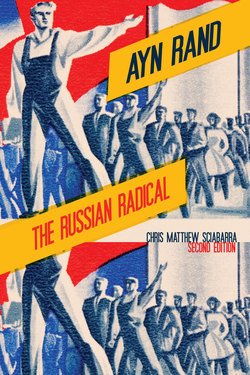Читать книгу Ayn Rand - Chris Matthew Sciabarra - Страница 10
На сайте Литреса книга снята с продажи.
ОглавлениеACKNOWLEDGMENTS
This book is the product of many years of research and dialogue. I owe a debt of gratitude to many individuals.
For their constructive comments on my earlier article, “Ayn Rand’s Critique of Ideology”: Walter Block, the late Roy Childs, Douglas Den Uyl, Howard Dickman, Antony Flew, Jeff Friedman, Robert Hessen, Robert Hollinger, Greg Johnson, Don Lavoie, Eric Mack, and Wallace Matson.
For aiding my historical research: N. O. Lossky’s sons Boris and Andrew, and grandson Nicholas; Brian Boyd; Helene Sikorski, sister of the late Vladimir Nabokov; Father Makarios Rigo; the late dean Father John Meyendorff and librarian Eleana Silk, of St. Vladimir’s Orthodox Theological Seminary; Bernice Rosenthal; James McClelland; and George Kline. Professors Kline and Rosenthal were also kind enough to share their meticulous comments on sections of this book. Special thanks to Robin Katz and Irina Kushnerik for their translations of letters and historical documents.
My acknowledgments also to the Ayn Rand Institute, Lectures on Objectivism, and Second Renaissance Books for giving me the opportunity to purchase and lease materials, including hundreds of hours of audio and video lectures by Ayn Rand and other Objectivists, and to Leonard Peikoff, Diane LeMont, and the Estate of Ayn Rand for timely correspondence on several issues of historical and legal significance to the current project.
For their financial and moral support: the Earhart Foundation, including David Kennedy and Antony Sullivan, and William O’Boyle and the Institute for Humane Studies, including Walter Grinder, Leonard Liggio, Jeremy Shearmur, and Chris Blundell.
For his conviction, perseverance, and belief in the importance of my work: Sandy Thatcher. For her assistance in the preparation of this book, Cherene Holland. For their painstaking copyediting and proofreading efforts: Andrew B. Lewis and Kerime Toksu. For their marketing efforts, Lisa Bayer, Alison Reeves, and Karen Walker. For the first edition jacket design, Steve Kress, and the second expanded edition, from re-conception to design to editing to production, the Penn State Press family: Patrick Alexander, Patty Mitchell, John P. Morris, Jennifer Norton, Robert Turchick, and Tony Sanfilippo.
For giving me the opportunity to interact with many scholars and students in an electronic forum: Svein Olav Nyberg’s Hegel study group; Paul Vixie’s “Objectivist” study group; and Jimmy Wales’s “Moderated Discussion of Objectivist Philosophy.”
Thanks also to David Kelley and the Institute for Objectivist Studies (now The Atlas Society) for sponsoring a 1993 colloquium on my book, which elicited helpful comments from Debra Cermele, Roger Donway, Elisa George, Laurence Gould, Karen Reedstrom, Joan Kennedy Taylor, Francisco Villalobos, and Michael Young. Thanks to Donald Heath and Jamie Dorrian for their assistance and delightful demeanor no matter how many times I interrupted them.
Thanks also to Ed Crane and David Boaz of the Cato Institute; Andrea Rich of Laissez-Faire Books; Ralph Volpicella and the Mil-Rite Printing staff; Angela Carannante, Lorraine DaTello, Nadine Goldstein, Michael Lipner, Ron Mangano, Mary Morse, and Kathy Sharp from New Dorp High School; the late James Bennett; Kathy Lendech and Turner Entertainment Company, and the folks at Robert’s One-Hour Photo; my New York University friends and colleagues, including Steve Faulkner, Farhad Kazemi, Kenneth King, Marilyn LaPorte, Richard Randall, Mario Rizzo, and Gisbert Flanz and Bertell Ollman, both of whom have greatly influenced my approach to political theory; Mary Toledo of the Reason Foundation; Barbara Branden, for her constructive comments and guidance; Nathaniel Branden for his insightful comments and for sharing The Six Pillars of Self-Esteem prior to its publication; Joe Cellantano; William Dale; John and Marsha Enright; Oz Garcia; Scott Gordon; Mike Hardy; Don Hauptman; Howard Kainz; Irfan Khawaja; Gema LaBoccetta; Robert McKenzie; E. Frederic Mirer; Gerard Power; David Ross; and Tim Starr.
For commenting on this manuscript in whole or in part: the late Bill Bradford, Robert L. Campbell, the late John Hospers, Roderick T. Long, Tibor Machan, Victor and Susan Niederhoffer, David Oyerly, Peter Saint-Andre, David Ramsay Steele, the late George Walsh, Charles Wieder, and several anonymous readers. An earlier draft of this book was reviewed by Allan Gotthelf. Though Professor Gotthelf strongly disagrees with my arguments concerning the sources and dialectical character of Ayn Rand’s thought, my final presentation benefited nonetheless from his helpful criticism.
I owe a very special debt of gratitude to seven people: Kathleen Rand, for her loyal support; Stephen Cox and Douglas Rasmussen, for their friendship and long-term support of, and critical commentary on, my work; Murray Franck, for his comments, indispensable legal advice, and friendship; and Roger E. Bissell, Michelle Marder Kamhi, and Louis Torres, for their friendship and encouragement of my efforts in countless ways.
Thanks also to so many others too numerous to mention, who helped me materially and spiritually; to my aunts, uncles, cousins, and friends, and also, to my immediate family, all of whom have been a source of profound personal support, especially my late mother, Ann; my late father, Sal; my late Uncle Sam; my sister, Elizabeth; my brother, Carl; my sister-in-law, Joanne; Pamela Bolen; Matthew Cappabianca; Mark Cwern; the late Michelle Ely; Annette Memon; Hiromi Shinya; Michael Southern; Elaine Thompson; Peter Vigliarolo; Richard C. Williams and Dante the cat; and my late dog Blondie, who, during some of my most difficult days, gave me firsthand evidence of the “Muttnik Principle” in action.
In acknowledging the above parties, I do not mean to suggest their implicit or explicit endorsement of any of the ideas herein expressed. What appears in this book is my own interpretation of Ayn Rand’s legacy and philosophy, for which I take full responsibility. I do not speak for a group or a movement, but only for myself.
